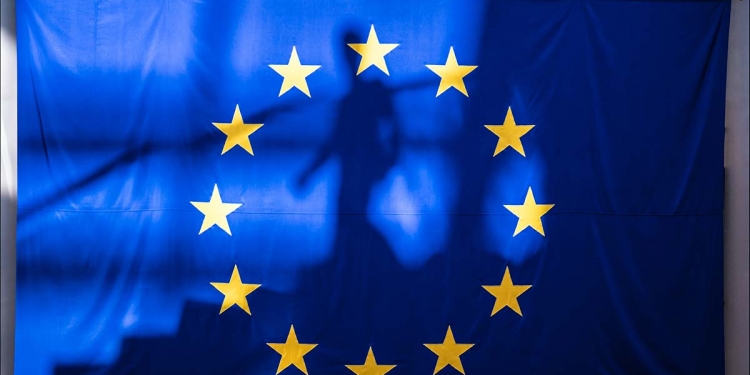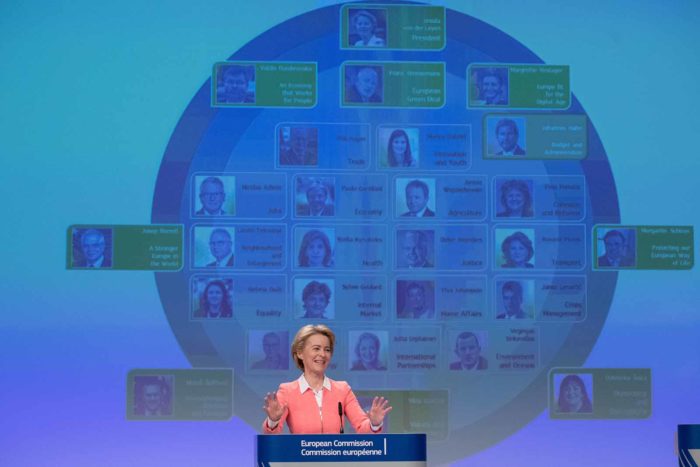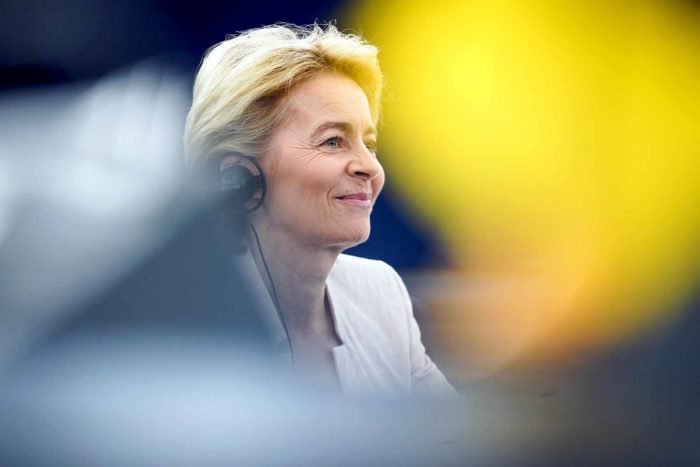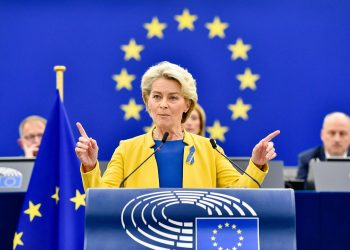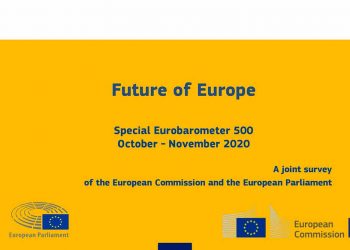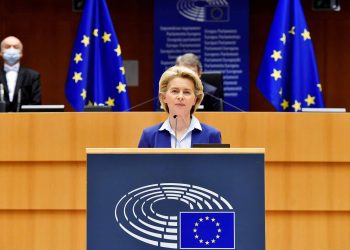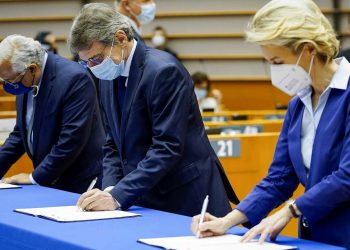Find here the complete list of new EU Commissioners from all EU27 countries and the portfolios delivered to them by Ursula von der Leyen.
Ursula von der Leyen announced her gender-balanced list of commissioners and the distribution of portfolios in a press conference in Brussels.
The new EU Commission will reflect the priorities and ambitions set out in the Political Guidelines. The Commission is structured around the objectives President-elect von der Leyen was elected on by the European Parliament.
The new EU Commission
The new College will have eight Vice-Presidents, including the High-Representative of the Union for Foreign Policy and Security Policy (Josep Borrell). The Vice-Presidents are responsible for the top priorities in the Political Guidelines. They will steer our work on the most important overarching issues, such as the European Green Deal, a Europe fit for the digital age, an economy that works for people, protecting our European way of life, a stronger Europe in the world and a new push for European democracy. The Commissioners are at the centre of the structure of the new College. They will manage the expertise provided by the Directorates-General.
Three Executive Vice-Presidents will have a double function. They will be both Vice-President responsible for one of three core topics of the President-elect’s agenda and Commissioners.
Executive Vice-President Frans Timmermans (Netherlands) will coordinate the work on the European Green Deal. He will also manage climate action policy, supported by the Directorate-General for Climate Action.
I want the European Green Deal to become Europe’s hallmark. At the heart of it is our commitment to becoming the world’s first climate-neutral continent. It is also a long-term economic imperative: those who act first and fastest will be the ones who grasp the opportunities from the ecological transition. I want Europe to be the front-runner. I want Europe to be the exporter of knowledge, technologies and best practice.
Executive Vice-President Margrethe Vestager (Denmark) will coordinate our whole agenda on a Europe fit for the digital age and be the Commissioner for Competition, supported by the Directorate-General for Competition.
Executive Vice-President Valdis Dombrovskis (Latvia) will coordinate the work on an Economy that Works for People and be the Commissioner for financial services, supported by the Directorate-General for Financial Stability, Financial Services and Capital Markets Union.
The five other Vice-Presidents are:
Josep Borrell (Spain, current Spanish Foreign Minister): HR/VP-designate, A Stronger Europe in the World;
Věra Jourová (Czech Republic, Commissioner in the Juncker Commission): Values and Transparency;
Margaritis Schinas (Greece, former Member of the European Parliament, long-serving official of the European Commission): Protecting our European Way of Life;
Maroš Šefčovič (Slovakia, Vice-President in the Juncker Commission): Interinstitutional Relations and Foresight;
Dubravka Šuica (Croatia, Member of the European Parliament): Democracy and Demography.
Dubravka Šuica will also lead, from the Commission side, the work on the Conference on the Future of Europe.
This will be a Commission that walks the talk. We have a structure that focuses on tasks not hierarchies. We need to be able to deliver on the issues that matter the most rapidly and with determination.
The new EU Commissioners
Johannes Hahn (Austria) will be in charge of ‘Budget and Administration’, and will report directly to Commission President Ursula von der Leyen. As a long-serving member of the College, he knows about the importance of nurturing a modern administration.
Didier Reynders (Belgium), who trained as a lawyer, is a highly experienced former national Finance Minister, Minister for Foreign and European Affairs and Minister of Defence. In the new Commission, he will be responsible for ‘Justice’ (including the topic of the rule of law).
Mariya Gabriel (Bulgaria) is a current European Commissioner. She worked with dedication and energy on the digital portfolio, and is now moving on to create new perspectives for the young generation (‘Innovation and Youth’ portfolio).
Stella Kyriakides (Cyprus) is a medical psychologist with many years of experience in the field of social affairs, health and cancer prevention. She will lead the ‘Health’ portfolio.
Kadri Simson (Estonia) is a long-serving member of the Estonian parliament and Minister for Economic Affairs and Infrastructure. She will be in charge of the ‘Energy’ portfolio.
Jutta Urpilainen (Finland) was not only Finance Minister and a long-standing member of the Finnish Parliament’s Foreign Affairs Committee; she has also worked as a special envoy in Ethiopia. She will take over responsibility for ‘International Partnerships’.
Sylvie Goulard (France), former Member of European Parliament, is a dedicated and convinced European. As the ‘Internal Market’ Commissioner, she will lead our work on industrial policy and promote the Digital Single Market. She will also be responsible for the new Directorate-General for Defence Industry and Space.
László Trócsányi (Hungary) is the former Minister of Justice of Hungary. He will lead the ‘Neighbourhood and Enlargement’ portfolio.
Phil Hogan (Ireland), the incumbent Commissioner for Agriculture, will bring his experience to the new Commission in the ‘Trade’ portfolio.
Paolo Gentiloni (Italy), former Italian Prime Minister and Minister of Foreign Affairs, will be sharing his vast experience in the ‘Economy’ portfolio.
Virginijus Sinkevičius (Lithuania), Lithuanian Minister for Economy and Innovation, will be responsible for ‘Environment and Oceans’.
Nicolas Schmit (Luxembourg) is bringing his experience from the European Parliament and his service as national Minister for Employment and Labour, and will now be responsible for the ‘Jobs’ portfolio.
Helena Dalli (Malta) has dedicated her political life to equality, serving as Minister for Social Dialogue, Consumer Affairs and Civil Liberties, and also as a Minister for European Affairs and Equality. She will lead the ‘Equality’ portfolio.
Janusz Wojciechowski (Poland) was a long-serving Member of the European Parliament in the Agriculture Committee, and is currently a Member of the European Court of Auditors. He will be in charge of the portfolio ‘Agriculture’.
Elisa Ferreira (Portugal) is currently Vice-Governor of Banco de Portugal. She has been a Member of the European Parliament for many years, and was the Portuguese Minister for Planning and Minister for Environment. She will lead the ‘Cohesion and Reforms’ portfolio.
Rovana Plumb (Romania) is a Member of the European Parliament (Vice-President of the Social and Democrats Group), and is a former national Minister of Environment and Climate Change, Minister of Labour, Minister of European Funds, Minister of Education and Minister of Transport. She will be in charge of the ‘Transport’ portfolio.
Janez Lenarčič (Slovenia) is a Slovenian diplomat. He was Secretary of State for European Affairs, and worked closely for several years with the United Nations, the Organisation for Security and Cooperation in Europe and the European Union. He will be in charge of the ‘Crisis Management’ portfolio.
Ylva Johansson (Sweden) is national Minister for Employment but also a former Minister for Schools and Minister for Health and Elderly Care and member of Swedish Parliament. She is also a highly respected expert in the fields of employment, integration, health and welfare. She will lead the ‘Home Affairs’ portfolio.
Next steps
As a next step, the European Parliament has to give its consent to the entire College of Commissioners, including the High Representative of the Union for Foreign Affairs and Security Policy/Vice-President of the European Commission.
This is preceded by hearings of the Commissioners-designate in the relevant Parliamentary committees, in line with Parliament’s Rules of Procedure.
Once the European Parliament has given its consent, the European Council formally appoints the European Commission, in line with Article 17(7) TEU.
Press conference on the unveiling of the new College of Commissioners

